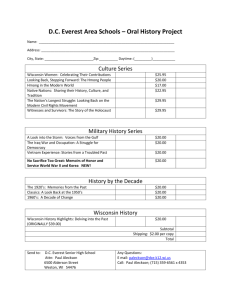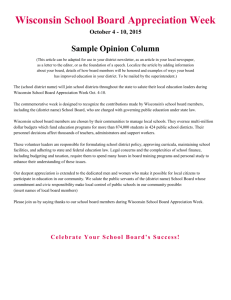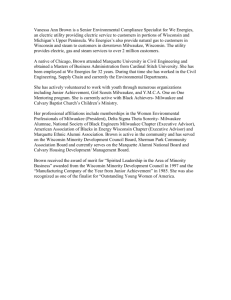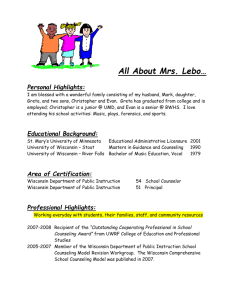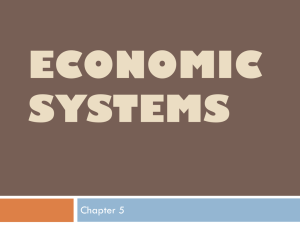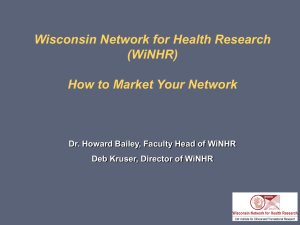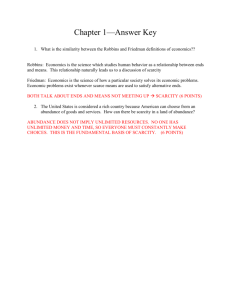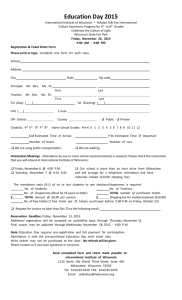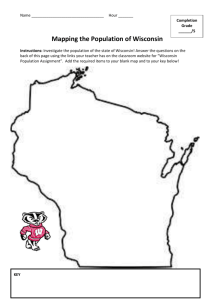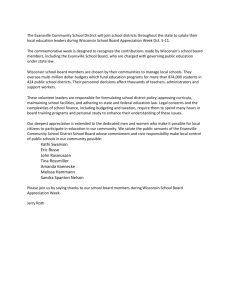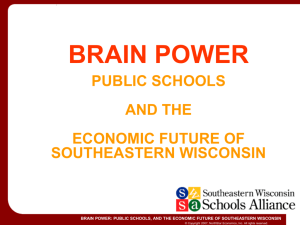Economic News Analysis Assignment
advertisement
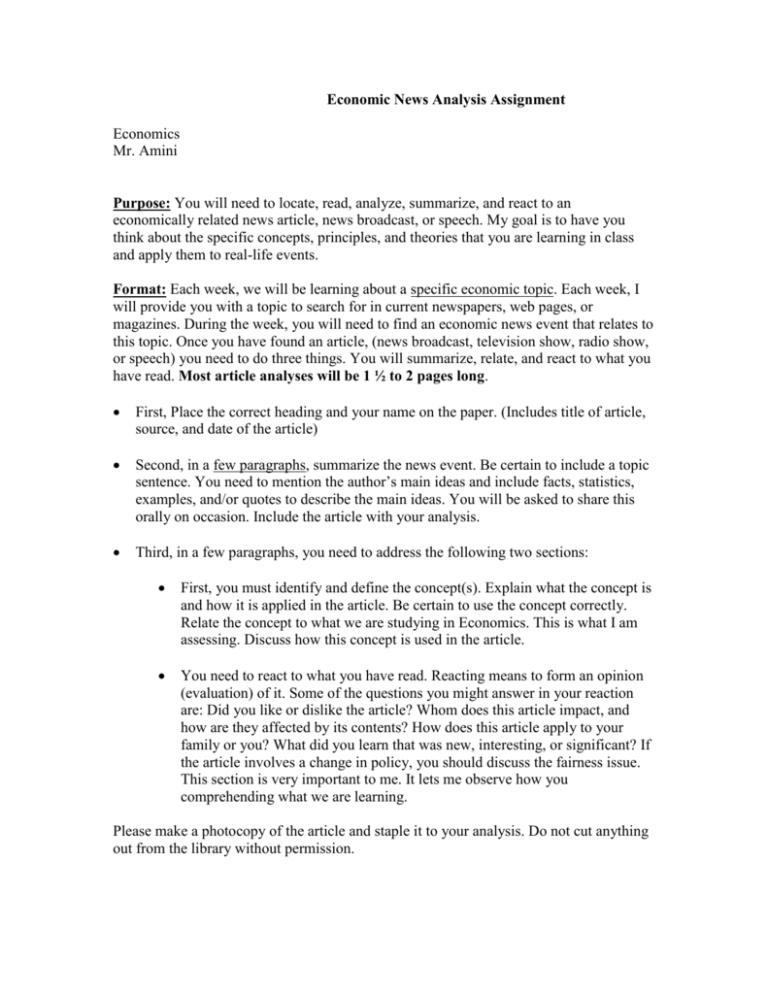
Economic News Analysis Assignment Economics Mr. Amini Purpose: You will need to locate, read, analyze, summarize, and react to an economically related news article, news broadcast, or speech. My goal is to have you think about the specific concepts, principles, and theories that you are learning in class and apply them to real-life events. Format: Each week, we will be learning about a specific economic topic. Each week, I will provide you with a topic to search for in current newspapers, web pages, or magazines. During the week, you will need to find an economic news event that relates to this topic. Once you have found an article, (news broadcast, television show, radio show, or speech) you need to do three things. You will summarize, relate, and react to what you have read. Most article analyses will be 1 ½ to 2 pages long. First, Place the correct heading and your name on the paper. (Includes title of article, source, and date of the article) Second, in a few paragraphs, summarize the news event. Be certain to include a topic sentence. You need to mention the author’s main ideas and include facts, statistics, examples, and/or quotes to describe the main ideas. You will be asked to share this orally on occasion. Include the article with your analysis. Third, in a few paragraphs, you need to address the following two sections: First, you must identify and define the concept(s). Explain what the concept is and how it is applied in the article. Be certain to use the concept correctly. Relate the concept to what we are studying in Economics. This is what I am assessing. Discuss how this concept is used in the article. You need to react to what you have read. Reacting means to form an opinion (evaluation) of it. Some of the questions you might answer in your reaction are: Did you like or dislike the article? Whom does this article impact, and how are they affected by its contents? How does this article apply to your family or you? What did you learn that was new, interesting, or significant? If the article involves a change in policy, you should discuss the fairness issue. This section is very important to me. It lets me observe how you comprehending what we are learning. Please make a photocopy of the article and staple it to your analysis. Do not cut anything out from the library without permission. Sources: This is just a partial list of some sources I would encourage you to look at: Newspapers: Wall Street Journal, Milwaukee Journal Sentinel (Business Section or Main Section), The Washington Post, The New York Times, The Chicago Tribune, USA Today (Money Section or Main Section). The Boston Globe, The Arizona Republic, and The London Times Magazines: The Economist, Time, Newsweek, U.S. News and World Report, Money, Forbes, Baron’s, Inc., Business Week, Fortune, The New Republic, The National Review, The Progressive The American Spectator, Mother Jones, the Nation, or The Utne Reader. Television: The Nightly Business Report, (channel 36 @7:30 & 10:00), Mad Money with Jim Cramer CNBC 8:00-9:00 M-F, CNBC Market Wrap-up, certain segments of 20/20, Dateline, 60 Minutes, CNN Primetime, PBS Specials. Grading: Hint: In the past, most “A” quality analyses are 2 pages in length. If you word process, please use a 12-point font and double space. If you write it, please use both sides of your lined paper. Each analysis should be written in ink or typed. You should use correct grammar, punctuation, and writing structure. Remember, you must include your name, your class hour, the title of the article, the source, and the article’s date in your heading. (Remember that sources are underlined and titles are placed in quotation marks.) You must place it in your portfolio and hand it in to me by the due date. Each analysis is valued at 15 points. At the end of the quarter, they will be valued as one test. I do take off points for lateness, incompleteness, and writing errors. Please be careful. All late analyses automatically start being graded at an 8/15. A+ 15 points A 14 points B 13 points C 12 points D F 11 points 0-10 points. Marc Stanke Economics Hr.3 Article Analysis #1 "State's Rich Get Richer, Its Poor, Poorer Milwaukee Journal-Sentinel January 18, 2005 I. Summary: According to a report issued by the Economic Policy Institute and the Center on Budget and Policy Priorities, the gap between "haves" and "have-nots" is widening. The separation between different income earners in Wisconsin is widening faster than anywhere else in the United States. The article states the lowest earning fifth of our population had an average family income of $16,690 in the late 1990's. That is 3% lower in un-inflated terms than in the 1970's. Also, it claims that the top fifth of income earners saw their incomes climb to $136, 404 on average. This is a 30% increase from the 1970's. Joel Rogers, from the Center on Wisconsin Strategy at the University of WisconsinMadison states, "If you throw in wealth figures, it only gets worse." A report issued by the Urban Institute found that income inequality is an indicator of child poverty. Their report goes on to state that there is a link between the widths of the income gap between rich and poor and greater dollar costs associated with impoverished children. The article said the analysts were not certain why the gap between income earners was larger in Wisconsin than in the rest of the U.S. Nationally, they blamed the inequality on a reduction in manufacturing jobs, immigration, increase in lower wage service jobs, and a decrease in union strength. The article does prescribe several solutions to remedy this dilemma. The researchers suggest raising minimum wage and indexing it to inflation, expanding the earned income tax credit, increase the amount of subsidized childcare and health care, and expanding unemployment insurance to more people. II. Reaction and Relation to Economics: This article relates to what we are studying in Economics in several ways. First, it is concerned with scarcity. Scarcity is a condition where there are not enough resources to meet everyone's needs and wants. People have a scarcity of money. They will have more demands for goods and services than they can afford. As a result of this, they will have to make choices. Secondly, it deals with economic systems. We learned there are four major types of economies. One type of economy is a free market economy, which is characterized by the interdependent actions of consumers and producers to meet societal wants and needs. One could easily argue that a market economy is not completely fair if people are working full-time jobs, and their income is low. Maybe, government should decide the "For Whom" question more. Lastly, this article is concerned with income security. There are seven main economic goals all societies try to achieve when answering the three basic economic questions. Among these is the goal of economic equity. Equity means fairness. It is evident from this article, that Wisconsin is not meeting this goal for its citizenry very well. It must do a better job. My initial reaction to this news was shock. I had heard that we were in the longest peacetime expansion of our economy's business cycle. As I shop in the malls and stores, I see help wanted signs. I would think that the wages people are receiving for work would be rising. I am troubles to know that one fifth of our population earns $17,000 a year. That's only a wage of $8.50! I must admit, I thought the income for Wisconsin's wealthiest fifth would have been higher than $136,000 a year. I know many people who live in this part of the state have that family income. Maybe, it's because both Mom and Dad work. The researchers seem surprised that Wisconsin has such a large gap. I wasn't certain of all of the researchers' recommendations. I don't know what an earned income tax credit is yet. But I think there should be something done to increase wages. I don't favor just giving away money. People need to understand the value of hard work, and why it's important to do well in school. No one is forced to go into a certain career. People ought to think more clearly when in high school about what they want to pursue. Perhaps guidance counselors should devote more time to this aspect of our education. I am very thankful to Mr. Stanke because he is making us aware of this so we can make wise decisions. (Personal aggrandizement, sorry!)
